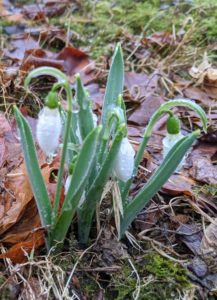Winter Gardening
- At January 17, 2021
- By drynick
- In Reflections
 0
0
The first sign in my household of the coming spring is the arrival of seed catalogues. They come with a reliability and glamour that belies the real nature of gardening which is much more provisional and gritty. I like both. But the catalogues have come this year, as they do every year, to remind me that in eight to ten weeks, I’ll be stumbling upon my first snow drops back by the side door where they seem to spring up overnight next to the snow piles.
Without periscopes or even eyes to look in the periscopes, how do they know the snow is gone? Do they grow in the frozen ground up to near the surface and wait to sense the warmth of the early spring sun before they make the final break into the light? Do they feel the release of pressure as the snow melts? And do I never notice them until I see their tiny nodding white blossoms a few inches above the ground because of the pace of their sprouting and blooming or is it that over each winter I loose the habit of paying attention to the earth at my feet?
So many questions. This lovely wondering is one of the delights of the gardening life. Even as I write this, my heart warms slightly and something, in the middle of winter, begins to grow inside me again.
I had a friend who taught art in high school and she said that her job was to teach her students to pay attention. It wasn’t about aesthetics or creativity or problem solving—all those things are a secondary outcome to the paying attention. I think it’s so with gardening and perhaps with most of life. Master gardeners, carpenters, lawyers and teachers are people who have learned to pay attention in particular ways.
Paying attention and wondering. If you ask me, this is the good life. I’ve never been good at being an expert. Though I have been known to have a strong opinion or two, what I like most is to appreciate the infinite wisdom and variety of the world—both around and within me. I’m enchanted by stories of the Chinese hermit Zen poets who refused positions of prestige and accountability. They lived lives of intentional obscurity and freedom. Of course the ongoing irony is that the ones we know about are the ones who were less successful. The truly successful hermits were never found and left no stories to seduce us. But perhaps the intention of some of these wild seekers of beauty was not to cut off connection, but to be free from the praise and opinion of others.
In Loving What Is, self-realized teacher Byron Katie wrote: “If I had one prayer, it would be this: “God, spare me from the desire for love, approval, or appreciation. Amen.” Many of us contort ourselves into intricate pretzels trying to be good or wise or competent enough to earn the love, approval and appreciation of others. Being free from the desire for these things that come and go is a great blessing.
But you can’t just say: ‘I don’t care.’ I mean you can say that, but it doesn’t change anything except to require more work to pretend that what is true is not true. These desires for approval and appreciation are natural and, despite what Katie preaches, are not a problem. Being human is complex, problematic and painful, but it is also wondrous, fascinating and endlessly emerging.
A better way to work with our human dependence on others is to let it be and learn to pay attention to what really interests us. Each of us are drawn to different parts—different aspects of the world. For me it’s the mud—the wet earth from which we and the tiny snow drops and the mighty oak all spring. The wet earth, that when it’s sticky enough can be shaped into vessels and containers that we can drink and eat from. These basic earth things delight me both in the doing and the considering.
 Now, mid-January, is the time of considering and dreaming of the gardens to come. I avidly page through the glossy photos, all perfect exemplars of what might be. I dreamof paths lined with blooming flowers and I look forward to the actuality of the thing itself which is gritty and emergent in ways photos can never be. My disappointments and inevitable failures will be more than balanced by the first green sprout that splits the moist earth and the fully improbable reality of those delicate snow drops that will be coming in the not too distant future.
Now, mid-January, is the time of considering and dreaming of the gardens to come. I avidly page through the glossy photos, all perfect exemplars of what might be. I dreamof paths lined with blooming flowers and I look forward to the actuality of the thing itself which is gritty and emergent in ways photos can never be. My disappointments and inevitable failures will be more than balanced by the first green sprout that splits the moist earth and the fully improbable reality of those delicate snow drops that will be coming in the not too distant future.


Follow David!